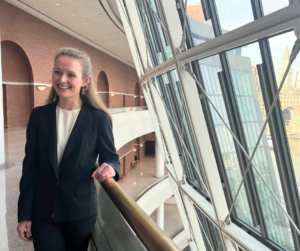By Harvard Law School student Annika Reno ‘24
It’s an icy February morning in Dorchester. You wake up and help your twelve-year-old daughter get ready for school. You prepare her breakfast before rushing out to warm up your car. But your parking spot is empty, and your car, gone. Confusion and then panic overtake you. On your way back inside you notice a letter taped to the front door of your building. The letter—from a law office you’ve never heard of—says you owe close to $25,000. If you hope to get your car back, you better pay up.

This is what happened to my client, Ms. T*, a single mom and cancer survivor who relied on her car to take her daughter to school, buy groceries, and attend doctor’s appointments. As an advanced clinical student attorney in LSC’s Consumer Protection Clinic, I had the opportunity to argue on Ms. T’s behalf in federal court. In an evidentiary hearing before a federal judge, I elicited testimony from Ms. T about what happened the day the defendants seized her car and about her consequent emotional pain and suffering. Together, we (Ms. T, my supervisor Alexa Rosenbloom, and I) made our case for an assessment of close to $55,000 in damages, including $15,000 for emotional damages. (I’ll spare you the suspense and mention here that the judge largely granted our requested relief.)
Writing now, with the benefit of 20/20 hindsight (and a favorable decision for Ms. T), this strikes me as straightforward a task as any for a student attorney at the Legal Services Center. At the time, though, it felt more complicated. Like everyone else, I took 1L Torts where we frequently considered the inadequate but necessary nature of compensatory and punitive damages. As it turns out, what they say about classroom learning is true: It’s no match for lived experience. (A cliché for a reason, I suppose.)
When I started to prepare for the hearing, my mind raced with questions. For one, what does it take to convince a federal judge you’ve suffered $15,000 worth of emotional pain? A quick search on Westlaw will show decisions awarding far less for similar violations in our jurisdiction. On this basis, you might find our request audacious. But when I spoke with Ms. T about the anxiety and depression that plagued her during and after the incident—about her paralyzing fear that it could happen again tomorrow—and about the shame she felt as a parent, unable to drive her daughter to school—$15,000 might as well have been pennies.
Monetary damages seem like an insufficient remedy for what Ms. T endured. In a just world, debt collectors would simply do their due diligence, comply with the law, and not seize a car they knew or should have known to be statutorily exempt from seizure upon execution. Of course most debt collection is hardly just. Ms. T had her life flipped upside-down by collectors’ unlawful conduct and deserved compensation. If our clients’ lives can’t be flipped right-side up, as if the misconduct never occurred, then money is a practical alternative, the “next best thing.”
Throughout our practice sessions leading up to the hearing, I struggled to balance my interest, as a student attorney, in eliciting the most emotional testimony with my desire, as a person, to prevent another’s pain. In the middle of a particularly rough patch of questioning, I mentioned this to Ms. T (while also apologizing and searching the room for a box of Kleenex). She responded coolly and told me not to worry; she understood the power of her own testimony.
The day of the hearing, all our practice sessions paid off. Although painful, Ms. T’s testimony conveyed the extent to which the defendants’ unlawful conduct impacted – and continues to impact – her mental and physical health. I wish we could turn back time and prevent the defendants from seizing her car in the first place. Absent a time machine, however, damages will do.
*Client’s name has been changed for confidentiality.
